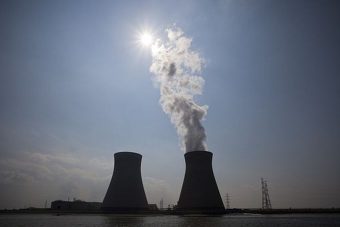
The government should press ahead with plans to develop small-scale nuclear technology, according to a new Policy Exchange report which argues nuclear power will be vital for achieving a fully decarbonised electricity grid.
The paper, which will be released today, argues a surge in electricity demand from electric vehicles (EVs), coupled with the need to phase gas and coal off the power grid, will leave a generation gap that is best solved with small modular nuclear technology.
It suggests other alternatives such as battery storage would prove too expensive to roll out on the scale needed to meet mid-winter power demand, while sourcing extra power through European interconnectors will become increasingly difficult as their grids decarbonise.
“Based on 2017’s data, this month is likely to see at least a week when solar and wind output is almost zero, meaning we can’t rely solely on them without huge investment in currently inefficient storage or backup power,” Policy Exchange’s energy and environment research fellow Matt Rooney said. “To power our current electricity system for a typical five-day working week in January using batteries alone would require the capacity equivalent to approximately 200 million Tesla Power Walls, which would cost up to £1tr.”
However, he argued effective alternative technologies could soon be provided by the nuclear sector. “There is no other low carbon energy which can match nuclear power for scale and reliability, as well as the potential to use it for other services like district heat and hydrogen production,” he explained. “The failure of the nuclear industry to prove that it can finance and build large reactors on time and to budget means that the development of small modular reactors must be one of the central goals of government energy policy.”
The nuclear industry has long argued that small modular reactors (SMRs), which produce about a tenth of the power of a large nuclear power station, could be quicker and cheaper to roll out than full-scale nuclear sites.
But analysis by consultancy Atkins for the Department for Business, Energy and Industrial Strategy, picked up by The Guardian, concluded energy from SMRs could cost more initially than large nuclear, because of the costs connected with developing new technologies and the loss of economies of scale.
Nevertheless, the Policy Exchange report recommends SMRs form part of the UK energy mix, and urges the government to “proceed swiftly” with the development of at least one third-generation SMR design once the results of the current government consultation on its next generation nuclear plans are published.
It also recommends a consultation into how heavy industry could use SMRs.
Meanwhile, SMR producers should start researching technology to allow nuclear plants to produce hydrogen, the report advised. Demand for hydrogen is likely to grow as it replaces natural gas on the heating grid and is potentially used to fuel cars and trains.
Source: businessgreen.com

